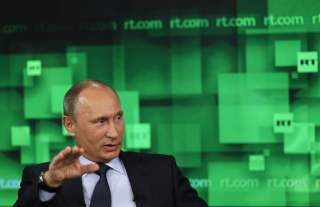How to Wage Political Warfare
Both Russia and China are governed by opaque, highly centralized and increasingly personalized governments that are well suited to the darker arts of statecraft. Political warfare, for such regimes, is second nature.
Third, even as policymakers court greater risk, they must manage expectations. At best, a political warfare offensive accumulates costs on the adversary, akin to compounding interest; it complements other measures in the military, diplomatic, economic and other realms. Democratic political warfare will neither end authoritarian political warfare nor change the nature of the Russian and Chinese regimes, at least any time in the foreseeable future. It might, however, knock back America’s rivals, make the terms of the competitions more favorable to Washington and preserve the possibility of longer-term political evolution—so long as the United States is willing to gird itself for an enduring struggle for initiative and advantage.
Finally, girding for that contest will require embracing the role of ideology and the clash of values. For too long after the Cold War, there was an assumption in U.S. policy circles that ideology no longer mattered and that authoritarian regimes in Russia and China could therefore be treated as useful transactional partners or even as actors that would come to see the blessings of full membership in the U.S.-led international order. This policy had its logic and its advantages. But by losing sight of the importance of ideology, Washington also lost sight of a fundamental driver of conflict with authoritarian states—the inherent clash between liberalism and illiberalism. No less, it deprecated its own ability, as a stable and vibrant democracy, to wage political warfare against repressive regimes. And to make matters worse, a values-based foreign policy fell into disrepute after the Iraq War: ideology came to be seen as something dangerous and quixotic, not as a fount of American strength.
This has it backward. During the Cold War, the administrations that most effectively waged political warfare never forgot the importance of highlighting the ideological differences between the United States and its adversaries. Restoring America’s competitive edge today, in a new era of competition with authoritarian rivals, will once again require putting the clash of ideas and values center-stage.
Hal Brands is the Henry A. Kissinger Distinguished Professor of Global Affairs at Johns Hopkins University’s School of Advanced International Studies and senior fellow at the Center for Strategic and Budgetary Assessments. His newest book, with Charles Edel, is The Lessons of Tragedy: Statecraft and World Order.
Toshi Yoshihara is a senior fellow at the Center for Strategic and Budgetary Assessments. He previously held the John A. van Beuren Chair of Asia-Pacific Studies at the U.S. Naval War College where he taught for over a decade. His latest book, with James R. Holmes, is the second edition of Red Star Over the Pacific: China’s Rise and the Challenge to U.S. Maritime Strategy.
Image: Reuters

